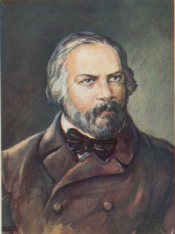
Mikhail Glinka “filled his works with the poetry of folk art”
June 1, 2020 marks the 216th anniversary of the birth of Mikhail Ivanovich Glinka, the great composer, founder of the Russian national opera, author of the world-famous operas Life for the Tsar (Ivan Susanin) and Ruslan and Lyudmila. The electronic collection “Mikhail Glinka (1804-1857)”, presented on the Presidential Library’s portal, provides studies of musicologist biographers, essays and visual materials devoted to the founder of the national trend in the development of Russian music.
Mikhail Glinka was born in Smolensk Region, in the village of Novospassky, on the estate of his father, a retired captain Ivan Nikolayevich Glinka, and in fact was immediately transferred to the hands of his grandmother.
Since 1817, Mikhail lived in St. Petersburg and studied at the Noble guesthouse at the Main Pedagogical Institute, and his poet and future Decembrist Wilhelm Küchelbecker became his tutor. In the 20s of the XIX century, Glinka was famous among Petersburg music lovers mainly as a singer and pianist. “Very curious, he first instinctively, then more and more thoughtfully comprehended the music, as a living language is comprehended in a living practice of speech, - first by ear, and then theoretically, then generalized the conquered”, - wrote Russian Soviet composer Boris Asafiev in his biographical essay “Mikhail Glinka” (1942).
In 1830, Glinka first went abroad - through Germany and Switzerland to Italy. The comprehension of brilliant Italian, and then other European culture began. After meeting Bellini, Donizetti, Berlioz, he begins to develop as a composer.
The electronic copy of the monthly historical publication Russian Antiquity stored in the Presidential Library G. 5, 1874, Vol. 9, [Book 4, April]” published Glinka's notes of the period where he wrote: “I work until lunch, the rest of the time with nice people in theaters, concerts... One can live here as he wants, no one takes care of what you do. In addition to the second concert of Berlioz, I did not yet have a strong musical pleasure. In my opinion, Berlioz is one of the most remarkable composers of our time - original and instrumental like no one else”.
While abroad, he also came into contact “with the greatest seriousness of German music”, - says Alexey Gruzinsky in the publication “Mikhail Glinka" (1904). The awakened national identity has not left the Russian musician since then. He realized that the work of composers from different countries was based on life-giving folk melos, and once admitted to Berlioz: “I understand, people create music. It’s time for Russian composers, who are still at the same level of randomly using folk song motives, to go one step higher”.
The idea of creating a national opera captures his imagination. “It seems to me that I could give a large composition in our theater”, - he writes to a friend from Berlin, quotes the composer Alexey Gruzinsky in the book “Mikhail Glinka” - The main thing is to choose a plot. In any case, it will be completely national. And not only the plot, but also the music”.
Then Russia is again: Petersburg, literary evenings with the poet Vasily Zhukovsky, where Glinka met Nikolai Gogol, Peter Vyazemsky, Vladimir Odoevsky, Alexander Pushkin. It was Zhukovsky who gave the young composer the idea to write an opera on the plot about Ivan Susanin - and it got on prepared soil, because, as a rare collector of Glinka’s melos, it was saturated with Russian folk tunes.
The premiere of the opera Life for the Tsar took place on November 27, 1836 (according to the old style). Pushkin was in the hall among the friends of Mikhail Ivanovich.
Shortly before the death of Pushkin, Mikhail Ivanovich managed to devote him to his plans to write an opera based on the plot of Ruslan and Lyudmila.
The first three performances the audience was cold, in fact it meant failure. “However, since the end of November 1842, for less than three months, Ruslan has sustained 32 performances, while the best of Rossini’s operas Wilhelm Tell passed only 16 times in the first season”, Avenarius reports. - For one season, Glinka got one-time three thousand rubles in silver. Only the decorator Roller was more content with him, who, without any worries, was awarded the title of academician for the sketches of the enchanted castle of Chernomor”.
Commenting on the appearance on the Russian stage of the opera Ruslan and Lyudmila, the composer Asafiev in his musicological study “Mikhail Glinka” notes the main thing: “Glinka sang the same thing as Pushkin: the light of reason and the clarity of wisdom, and just like the great Russian poet, remembering the treasures of the human heart, for there is neither music nor true poetry outside their breath".
The place of Mikhail Glinka in Russian culture was most precisely determined by the critic Vladimir Stasov: “In many ways, Glinka has the same meaning in Russian music as Pushkin in Russian poetry. Both are great talents, both are the founders of the new Russian art, both created a new Russian language - one in poetry, the other in music”.

